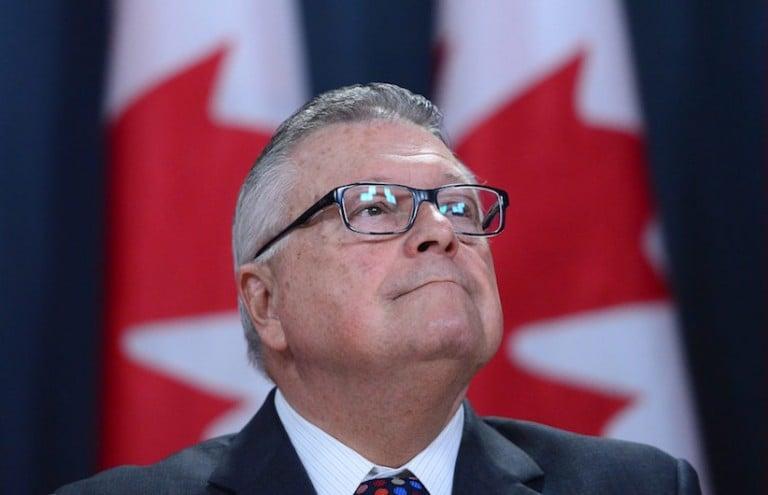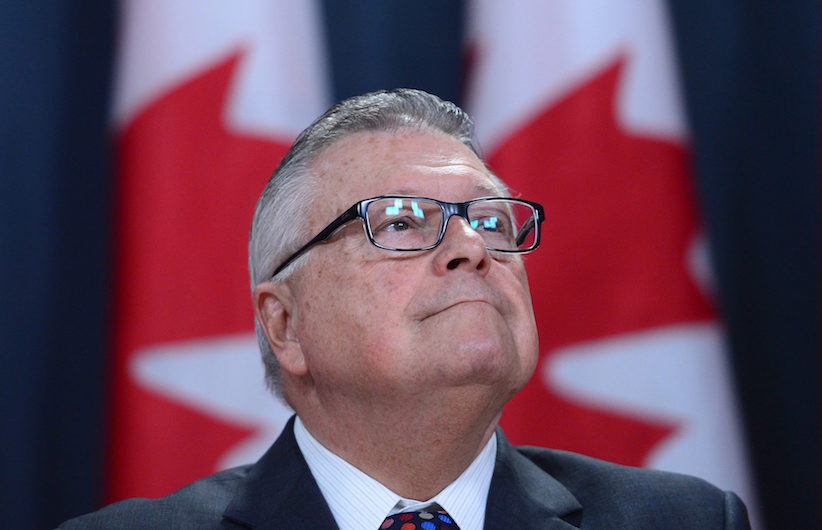Canada’s counter-radicalization program has a problem
Ottawa has been searching for a coordinator to lead its office since 2015, and the odds of getting just the right person aren’t good

Ralph Goodale, Minister of Public Safety and Emergency Preparedness makea a national security-related announcement at the National Press Theatre in Ottawa on Tuesday, June 20, 2017. THE CANADIAN PRESS/Sean Kilpatrick
Share

A name with street cred, an academic, a government insider—the Canadian government’s coordinator of counter-radicalization will need to be three-in-one.
“Boy, it’s awful hard to find someone with all those bits and pieces,” says Michael Day, a retired lieutenant general of the Canadian Forces and current board member of the Mackenzie Institute, a public policy think tank based in Toronto. “Those aren’t three solitudes that are easy to reconcile, quite frankly.”
Public Safety Canada was tasked with establishing an office of the coordinator of community outreach and counter-radicalization in 2015, as the third of 12 expectations in the mandate letter of Minister Ralph Goodale. The office will coordinate efforts and research to prevent violent extremism in ways “that reflect local realities.” With 13 staff already, $35 million over five years and 10 research initiatives underway, the office has begun coordinating, but still it has no coordinator.
“We will take the time that’s needed to find the right candidate,” says Scott Bardsley, a spokesperson for Goodale’s office. In the meantime, the funded research includes Project SOMEONE, based at Concordia University, which has investigated the lyrics of extreme metal music.
Another project called Digital Shepherds Canada helps parents “reel in their wayward youths who may currently be heading down a self-destructive path and are utilizing today’s technology (i.e. sexting, internet pornography, mass amounts of media piracy) to aid them in their unsavoury endeavours.”
The office is now called the Canada Centre for Community Engagement and Prevention of Violence (CCCEPV), and its coordinator must be respected by religious and ethnic groups where counter-radicalization efforts are happening, such as the Somali Muslim community and the Quebec punk music scene, which has become a recruiting ground for white supremacists.
Day suggests that a socially progressive figure may not resonate with many of the groups the centre will work with, and the coordinator may instead be more conservative-minded. “The huggy, kissy, lovey public view of what a liberal is—I’m not sure that’s going to be a demographic to look for in a candidate,” he says, adding that, “first and foremost it has to be a Muslim, but in five or 10 years, it may have to be another religion or demographic.”
The coordinator will need to manage academic researchers and have the intellectual background to establish terms of reference, and also be able to navigate government bureaucracy. When the government appointed commissioners to the National Inquiry into Missing and Murdered Indigenous Women and Girls, none of the candidates came from the civil service, and they’ve struggled with hiring processes, expense reimbursement and other Government of Canada idiosyncrasies.
The new federal coordinator may need to pick up where the RCMP has reportedly faltered in its anti-radicalization efforts, and hopefully harmonize the myriad counter-radicalization efforts in Canada, from physicists at Canadian Nuclear Laboratories creating a mobile mass spectrometer that could aid nuclear counter-terrorism, to Waterloo sociologists who study foreign fighters headed to Syria and Iraq on their “quest for significance.”
How could a federal centre actually counter-radicalize extremists? Quebec offers a model. It set up the Centre for the Prevention of Radicalization Leading to Violence in March 2015, and the centre does workshops in schools to warn children about extremist recruitment tactics and offers a telephone helpline.
When parents call the helpline, staff put a safety net around youth by connecting them with imams, psychologists, family mediators, or whatever the case calls for. “We don’t have a magic recipe for that,” says Benjamin Ducol, head of research at the centre in Montreal.
One mother called the helpline after her son was rejected from the Canadian military and turned to considering foreign militias. “We talked to the kid himself,” says Ducol. “At some point he was very obsessed with Syria, not fighting with ISIS but with the Kurds.”
The centre connected the boy to veterans, who acted as mentors and helped change his trajectory. The boy has gone on to work in industrial kitchens, and Ducol says, “we are going to be very, very, very involved in following up.”
The director of the Quebec centre is Herman Deparice-Okomba, a doctor of political science who served for 10 years with the Montreal police service, offering hope that a federal equivalent will be possible to find.